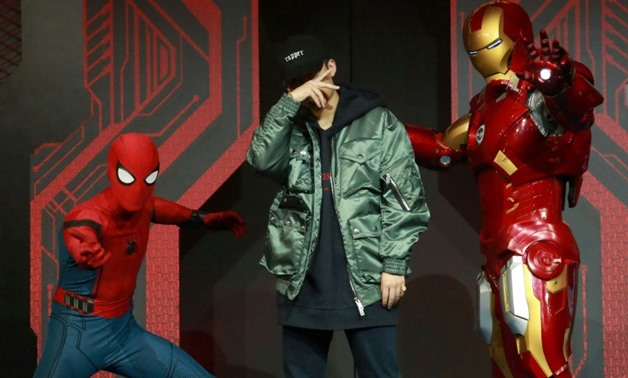
PG One, one of China's best-known rappers, apologised two weeks ago after he came under fire from official media. They highlighted lyrics from one of his songs in which he boasts obscenely about forcing himself on a woman and appears to promote drugs - AF
22 January 2018: Chinese music fans are bracing for a crackdown on hip hop after a rapper was apparently dropped from a popular singing programme, as reports emerged that the government had soured on the often-provocative genre.
Hip hop is a late arrival to China's cultural scene but homegrown artists have steadily gained fans, getting a major boost over the past year thanks to singing-contest reality programmes showcasing their talent.
But rappers have recently raised hackles with vulgar or edgy lyrics, and fans fear hip hop has become the latest target of an escalating crackdown on content deemed potentially threatening to the ruling Communist Party.
On Friday social media began circulating a government order apparently issued to Chinese broadcasters banning them from giving air time to "artists with tattoos, hip hop music" and other performers who are "in conflict with the party's core values and morals".
Popular portal Sina.com said the directive came from Gao Changli, a top official with the government agency that oversees the media. The order has not been officially released.
But a rapper known as GAI, who has nearly four million followers on China's Twitter-like Weibo platform, was suddenly absent from Friday's airing of the popular reality show "Singer".
GAI is now no longer featured as one of the contestants, prompting online speculation that he was a casualty of the new rules.
"This is a sign that hip hop will be banned," said one of many comments on Weibo.
- 'Cultural regression' -
"Although some of it is rubbish, hip hop itself is not wrong. Its core spirit is still positive... Hip hop has just emerged and now it is being rudely banned. Isn't this cultural regression?"
Other postings ridiculed the government's media watchdog agency.
"How many examples of fine culture and excellent works have had their value twisted by the hands of this idiotic agency? I'm ashamed of your behaviour," said one.
Chinese hip hop entered the national spotlight last year with the debut season of the wildly popular "The Rap of China", an internet-based reality-show rapping competition.
The show, which finished its first season in September, accumulated nearly three billion online "views".
But China's emerging hip hop subculture seemed destined to run afoul of the Communist Party, which has dramatically tightened its grip on free expression under President Xi Jinping.
In an ongoing crackdown on expression, the media, internet and the arts, vulgar or provocative content is out, while patriotic and "harmonious" content -- code for pro-party propaganda -- is in.
Last summer a rapper from the southwestern city of Chengdu known as "Fat Shady" drew attention with a song called "Stupid Foreigners", a profanity-laced rant against foreigners living in China.
Two weeks ago PG One, one of China's best-known rappers, apologised after he came under fire from official media. They highlighted lyrics from one of his songs in which he boasts obscenely about forcing himself on a woman and appears to promote drug use.
There is now rising online speculation over whether "The Rap of China" -- which vaulted several contestants to fame and helped them land recording contracts -- would be allowed back for a second season.
Predictions of the show's demise have been fuelled by reports that the latest instalment of a nationwide concert tour based on the programme was cancelled over the weekend in the central city of Wuhan, with organisers blaming unspecified "unavoidable factors".

Comments
Leave a Comment